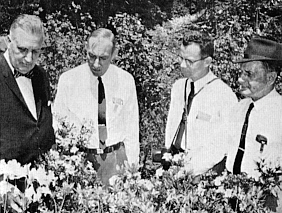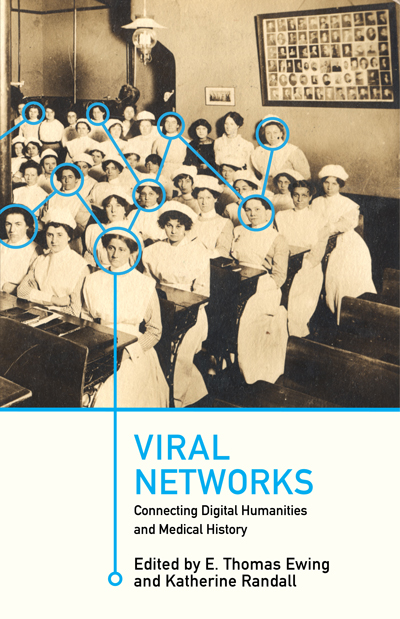QBARS - v17n3 1963 Spring Meeting of Middle Atlantic Chapter
1963 Spring Meeting of Middle Atlantic Chapter and
First Flower Show School For Rhododendrons
Richmond, Virginia, May 3-6
Mavis Haywood, Richmond, Va.
The 1963 Spring Meeting of the Middle Atlantic Chapter was more than just an annual meeting. The program was published in the April, 1963 Quarterly Bulletin.
The meeting, under the Presidency of Dr. Thomas Wheeldon, was a combined effort to have a flower show school on rhododendrons, and to expand all three previous facets of our regular procedure. First, the social aspect is always tremendous, because there is such unanimity among the members; such expressions of friendship, and such a general interchange of ideas. Second, we always try to show the development of various areas. This may be the introduction of special plant material, an explanation of propagation, or a study of various types of gardens of our members, as it was this year. Third, a tour of gardens, arboreta, etc.
To go back a matter of several months-immediately after the successful sponsoring of the annual meeting of the A.R.S. in Winterthur, we began our plans. The program of publicity was instituted early in the year, and it was very satisfying to find that the work of the Chapter had become so well known generally, as to make it easy to obtain the cooperation of both the local newspapers, and those in the Washington area, and various horticultural publications. The television and radio stations were, also, very cooperative.

|
|---|
Fig. 26. Speakers for the 1963 spring meeting of the Middle Atlantic Chapter. Left to right, Dr. Clement Bowers, Dr. Henry Skinner, Mr. Gordon Jones, Mr. Paul Vossberg. |
The first session on Friday evening was held at the Executive Motor Hotel, and this organization provided facilities usually found only in much larger cities. This first session was a "Discussion Period" with Dr. Henry T. Skinner, Director of the U. S. National Arboretum, as leader. We were happy to have present, Dr. Clement G. Bowers of Maine, N.Y.; Mr. Gordon E. Jones, Director of Planting Fields Arboretum, Oyster Bay, N. Y.; and Mr. Paul Vossberg of Westbury, Long Island, known widely for his knowledge of rhododendrons. Men on the local committee at the head table were: Dr. Irving Roberts, Franklin D. Robins, Charles A. Gregory, Jr., Harry Bowen, A. J. Shoosmith, Wendell Powell, Merritt Taylor, and N. H. Turbeville, the latter of whom introduced Dr. Skinner.
Following the discussion period, the individual members, guided by Wendell Powell, showed slides taken at previous meetings, and of interesting plant material. Dr. Skinner presented slides illustrating the work at the National Arboretum.
On Saturday, May 4, the group visited and studied gardens of four local members. Three of these gardens (one of which contains some 26 acres) have been developed by the members themselves. The fourth garden was planned by Mr. Kenneth Higgins, one of our landscape architects. It was evident that this satisfied the group, because of the intense interest shown in studying various phases of the gardens, and the plant material present.
Later in the afternoon, the group was entertained at "Woodlawn," home of Mr. and Mrs. Thomas Kennedy. "Woodlawn" is a very old Virginia home, which houses very rare antiques collected by Mr. and Mrs. Kennedy. This was a rare event, for some of the furniture observed has been desired for use in the refurbishing of the White House.
Saturday evening at the Commonwealth Club, Mr. A. J. Shoosmith introduced Mr. Gordon E. Jones, who delivered the lecture and showed slides following a social hour and dinner. We are indebted to Mr. Umberto Innocentia for Mr. Jones' presence. Orchids presented by our member, Dr. Edgar McPeak of Kensington Orchids, Inc., served as the main centerpiece, and arrangements of rhododendrons and azaleas were used on the individual tables. Azaleas had been massed for decoration on Friday evening.
On Sunday, May 5, the group convened at Gladsgay Gardens, home of Dr. and Mrs. Thomas Wheeldon, for a general tour of the garden and the propagating houses. An exhibit of approximately 700 cultivars of azaleas and rhododendrons was staged on the front lawn. The point was made that all of this material was cut from the garden that morning, and that everything exhibited could be grown in this locality. Dr. Skinner brought a special group from the National Arboretum.
On Monday, May 6, a Rhododendron Flower Show School was held, beginning at 9 a.m. at the Executive Motor Hotel, and moving to Gladsgay Gardens after lunch. Dr. Clement G. Bowers and Mr. Paul Vossberg conducted the program. Assistance in setting up the program was given by Mrs. D. H. Patteson-Knight of McLean, Va.; Mrs. W. T. Wilson, Secretary of the American Horticultural Society; Mrs. Elbert Cox and Mrs. Curtis Davis of Richmond. The baccalaureate portion of the program consisted of talks by Dr. Bowers and Mr. Vossberg. We were pleasantly surprised by the number attending, there being 45 in attendance. After the group observed the exhibits and studied the material there was a "Mock Judging" of rhododendrons by Dr. Bowers, Mr. Jones, and Mr. Vossberg, with the usual irrelevant interferences to which judges are frequently subjected. Mrs. Clement Bowers added a great deal of wit to this phase of the judging.
Brochures compiled by the New York Chapter on "Rhododendrons for the Northeast" were made available to the group, and created a great deal of timely interest. The local Ladies Committee was extremely active in oiling the machinery of the meeting and every person present unstintingly added his part.
The 1964 Spring Meeting will probably be held in Charleston, South Carolina. The second course of the Rhododendron Flower Show School will be held in Washington, D.C. in 1964, and the third course, in Philadelphia in 1965.
The Middle Atlantic Chapter decided to undertake the classification and rating of azaleas, which we hope will be under the direction of our own member, Mr. Frederic P. Lee, author of "The Azalea Book."
At a short business meeting, it was unanimously decided that the organization remain "status quo.

